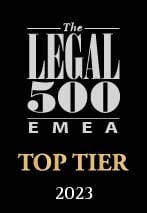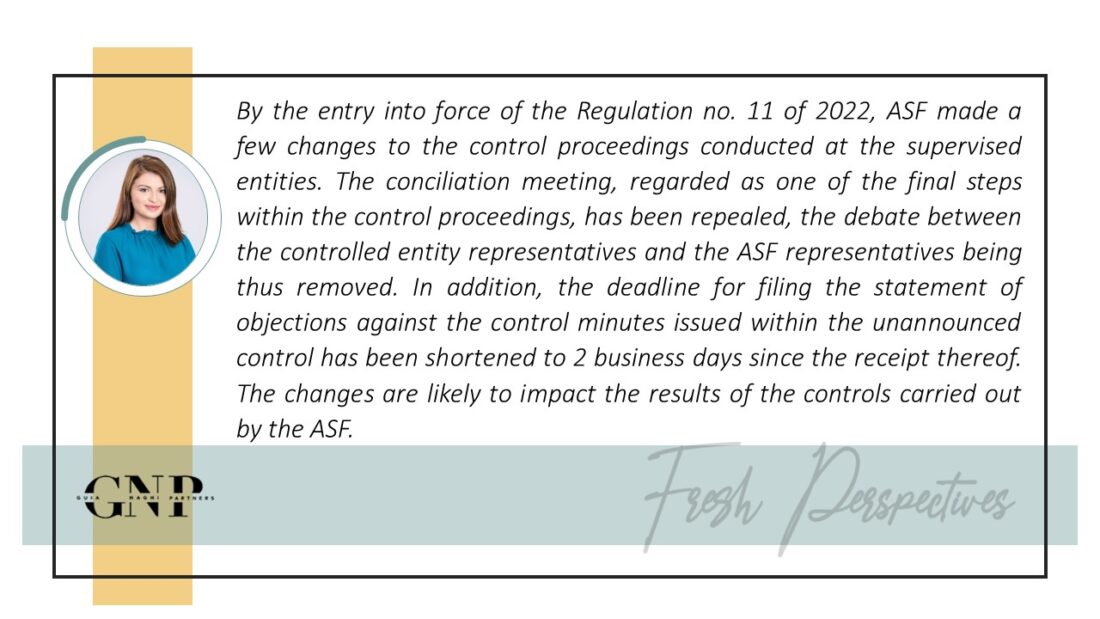Violeta Geru – ASF has updated the rules governing the control proceedings conducted at the supervised entities
Regulation no. 11 of 18 May 2022 amending the ASF Regulation no. 4 of 2021 on the control activity carried out by the ASF (“Control Regulation”) was published in the Official Gazette and entered into force on 30 May 2022, the newly enacted provisions being applicable to all control activities carried out by the ASF after the publication thereof.
The amendments brought to the Control Regulation are applicable to all the companies supervised by ASF. However, considering the recent practice of the national supervisory authority, as well as the recent developments on the Romanian market, the amendments are of interest particularly to the insurance companies which are more likely to be subjected to a control by ASF.
The removal of the conciliation meeting from the control proceedings
The conciliation meeting, regarded as a mandatory step within the control proceedings, was first introduced by ASF starting with 12 August 2020, following the amendments brought to the previous control regulation (i.e. Regulation no. 11 of 2016).
The conciliation meeting, defined as a meeting between the representatives of ASF together with the representatives of the controlled entity, was aimed at clarifying the divergence between the findings of the control team and the objections put forward by the controlled entity.
Introducing the conciliation meeting as a step within the control proceedings was the result of public debates conducted in 2020 between the representatives at the industry level and ASF. The conciliation meeting was meant to strengthen the cooperation between the controlled entities and the supervising authority. On the one side, the meeting was an opportunity for the control team to finalize its findings by listening to the controlled entity’s arguments, thus leading to a documented and a more accurate proposal on the results of the control. On the other hand, the conciliation represented an opportunity of dialogue with the authority’s representatives, creating a forum for debate where the controlled entities could have had a better understanding of the requirements of the supervising authority.
Although the advantages of the conciliation meeting were observed in practice, after almost two years the step was removed entirely from the control proceedings. We are not aware of the reasoning behind the decision the repeal the conciliation meeting during the controls conducted by ASF. The approval note accompanying the draft proposal did not provide for any explanation regarding this change in the Control Regulation.
The conciliation meeting was designed to ensure a more effective application of the right of defense of the controlled entities, therefore the removal of this step, without providing a proper justification in connection thereto does not seem to comply with the principles set out by the European Insurance and Occupation Pensions Authority (“EIOPA”). The change of policy is even more surprising in a time when EIOPA is fostering the cooperation between the national supervisory authorities and the supervised entities.
It remains to be seen if the removal of this opportunity to dialogue during the controls will have an impact on the likelihood of sanctioning the controlled entities and on the disputes arising in connection thereof.
The deadline for submitting the statement of objections was changed
According to the current form of the Control Regulation, the controlled entities have the possibility to file a statement of objections against the findings of the control team:
- Within maximum 7 business days since the receipt of the control minutes in case of a periodic control; and
- Within maximum 2 business days since the receipt of the control minutes in case of an unannounced control
The older version of the Control regulation provided for a deadline of 7 business days to file a statement of objections irrespective of the type of control. Therefore, the deadline for submitting the objections within the unannounced controls was now shortened to 2 business days.
The disparity in terms of proceedings and deadlines depending on the type of control is not new. As such, pursuant to the Regulation no. 11 of 2016 (repealed by the entry into force of the Control Regulation), the deadline for submitting a statement of objections was of 3 business days for the unannounced control, respectively of 7 working days for the periodic control.
As in the case of the amendments related to the conciliation meeting, it seems that ASF is returning to the previous supervisory and control policy, applicable before the entry into force of the control framework set by the new Control Regulation.
The shortening of the term for filing the statement of objections in the case of unannounced control does not appear to have an objective justification, considering that the only relevant difference between the periodic control and the unannounced control is that the entity is not notified in advance regarding the latter. Moreover, according to EIOPA guidelines, the national authorities should ensure a reasonable timeframe to the controlled entities to state their objections. Given the subject of the controls and the complexity of the findings, the entities falling under the scope of the Control Regulation are concerned about the reasonableness of the shortened term.
Nevertheless, the amendment is linked to another significant change applicable to the control team activities. According to the provisions of article 22 para (1)1 of the Control Regulation, the control team must observe a 2-days timeframe since the control is finalized for sending the control minutes to the supervised entity. Therefore, the ASF considered a symmetry between the control team and the supervised entity.
Other amendments brought to the Control Regulation are related to the remote activities of the control team, regulating also with more clarity the electronic correspondence with the authority.





No Comments